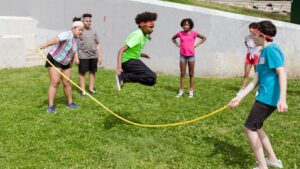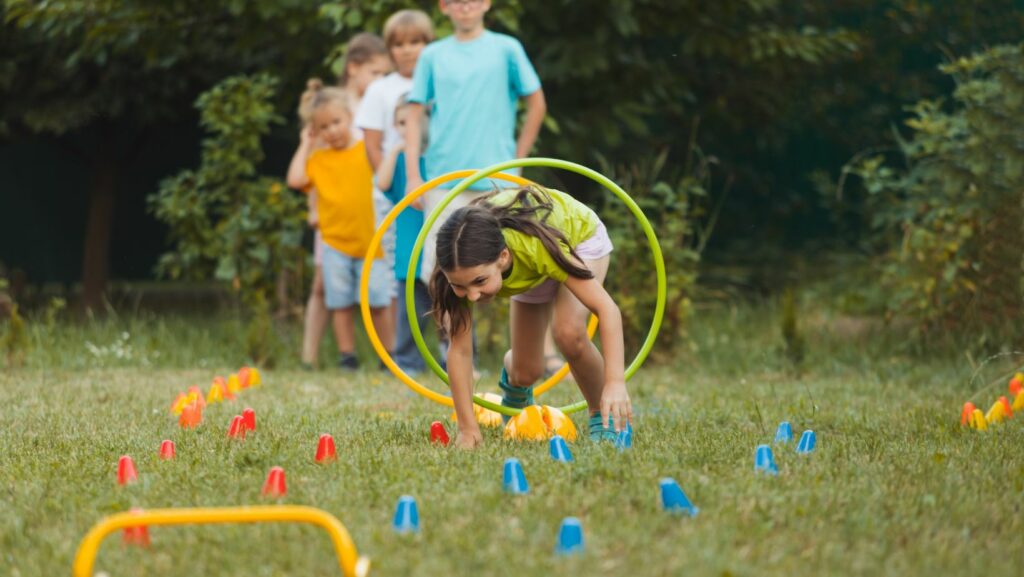Park Games for Kids
Park games for kids play a crucial role in enhancing both their physical health and cognitive abilities. These activities leverage the outdoor environment to offer a dynamic setting for growth and learning.
Physical Health Benefits
 Participating in park games improves children’s physical health in several significant ways. First, regular physical activity boosts cardiovascular fitness, aiding in the development of heart and lung function. Games such as tag or soccer increase endurance and help maintain a healthy weight. Second, children enhance their motor skills by engaging in games that require running, jumping, and throwing—for example, frisbee or hopscotch. Finally, outdoor play exposes children to sunlight, which is vital for vitamin D synthesis, essential for bone health and immune function.
Participating in park games improves children’s physical health in several significant ways. First, regular physical activity boosts cardiovascular fitness, aiding in the development of heart and lung function. Games such as tag or soccer increase endurance and help maintain a healthy weight. Second, children enhance their motor skills by engaging in games that require running, jumping, and throwing—for example, frisbee or hopscotch. Finally, outdoor play exposes children to sunlight, which is vital for vitamin D synthesis, essential for bone health and immune function.
Cognitive and Social Skills Development
Park games also contribute to cognitive and social skills development. Children learn problem-solving skills by navigating the rules and strategies of games like hide and seek or capture the flag. They also practice decision-making skills rapidly and under pressure during fast-paced games. Furthermore, these games provide a platform for social interaction, helping children develop communication skills and emotional intelligence. Engaging in team-based games fosters teamwork and teaches the importance of cooperation and fair play.
Popular Park Games for Kids
Tag and Its Variations
 Tag is a classic game that involves one player chasing others in an attempt to “tag” or touch them, making them “it.” Variations of Tag serve to keep the game engaging. “Freeze Tag” changes the dynamics by requiring tagged players to stand still until another player unfreezes them. “Chain Tag” introduces teamwork by having tagged players join hands with “it,” complicating the game as the chain grows longer. Each variant helps develop agility, speed, and spatial awareness among participants.
Tag is a classic game that involves one player chasing others in an attempt to “tag” or touch them, making them “it.” Variations of Tag serve to keep the game engaging. “Freeze Tag” changes the dynamics by requiring tagged players to stand still until another player unfreezes them. “Chain Tag” introduces teamwork by having tagged players join hands with “it,” complicating the game as the chain grows longer. Each variant helps develop agility, speed, and spatial awareness among participants.
Hide and Seek
In Hide and Seek, one player closes their eyes and counts to a predetermined number while the others hide. The seeker then tries to find the hidden players. This game is excellent for teaching kids patience and problem-solving skills, as seekers must strategize where to search, and hidden players find clever spots to stay concealed. Hide and Seek also nurtures creativity and can be particularly thrilling when played in diverse park environments that offer a variety of natural hiding places.
Ball Games
 Ball games in parks can include soccer, basketball, or simple catch and throw activities. These games demand coordination, teamwork, and fine motor skills. Playing soccer, for instance, promotes cardiovascular health and strategic thinking as kids decide their next moves in the context of their teammates’ and opponents’ positions. Basketball improves jumping skills and precision. Regularly engaging in these sports enhances children’s cooperation skills and bolsters physical fitness through dynamic movement and cardiovascular exercise.
Ball games in parks can include soccer, basketball, or simple catch and throw activities. These games demand coordination, teamwork, and fine motor skills. Playing soccer, for instance, promotes cardiovascular health and strategic thinking as kids decide their next moves in the context of their teammates’ and opponents’ positions. Basketball improves jumping skills and precision. Regularly engaging in these sports enhances children’s cooperation skills and bolsters physical fitness through dynamic movement and cardiovascular exercise.
Innovative Park Games Ideas
 Encouraging children to participate in park games is a fantastic way to enhance their physical and mental well-being. These activities not only keep them active but also play a crucial role in their overall development. By incorporating games like Tag, Hide and Seek, and various ball games into regular playtime parents and caregivers can ensure kids gain valuable skills in a fun supportive environment.
Encouraging children to participate in park games is a fantastic way to enhance their physical and mental well-being. These activities not only keep them active but also play a crucial role in their overall development. By incorporating games like Tag, Hide and Seek, and various ball games into regular playtime parents and caregivers can ensure kids gain valuable skills in a fun supportive environment.
Planning a park game day requires attention to detail and an understanding of the children’s needs and interests. By choosing the right mix of activities and ensuring safety measures are in place everyone involved can enjoy a memorable day full of laughter and learning.
Ultimately park games offer a unique blend of benefits that extend beyond simple play. They’re about building healthier happier and more connected communities—one game at a time. Let’s embrace these opportunities to enrich the lives of our children while fostering a love for outdoor activities.

